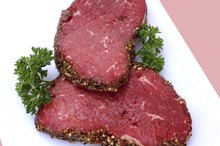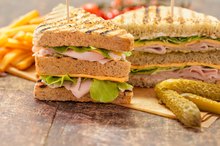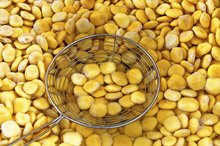Rice & Bean Diet
The Reader’s Digest Association highlights rice and beans as "healing foods" to include in your regular diet. Rice is a starchy carbohydrate that provides vitamins and minerals such as B vitamins and iron. Beans are high in vitamins A and C, folate and fiber. Beans are considered an "incomplete protein" because they lack certain essential amino acids. To become a "complete protein," they need to be combined with grains such as rice that provide the missing amino acids. Seek the guidance of your health care professional before making changes in your diet.
Types of Rice
Rice is a versatile grain that is a staple in your diet. Several varieties are found worldwide including Basmati, Jasmine, Arborio, Black Japonica, risotto, long-grain white and brown rice. Brown rice is the most nutritious grain to include in your diet. Brown rice has not been stripped of its bran layer which contains fiber, vitamins and minerals. Brown rice retains such nutrients as niacin, magnesium, selenium and vitamin E. The fiber in brown rice helps lower the glycemic index but still has a slight affect on your blood sugar level if you struggle with diabetes.
Types of Beans
Brown Basmati Rice Nutrition Information
Learn More
There are hundreds of different varieties of bean. The most popular beans consumed include adzuki, black, cannellini, kidney, pinto, red and soybeans. Beans are nutritious plant foods that provide large amounts of fiber. Fiber is important in controlling blood cholesterol levels and promoting regularity. Beans are complex carbohydrates that are slowly released as glucose in the bloodstream. Beans are ideal for diabetics because they do not cause blood sugar levels to dramatically increase like simple carbohydrates.
Function of Iron
Rice and beans are top sources of the mineral called iron. Iron’s main function is to transport oxygen to all the cells in your body. Iron is used to make hemoglobin which acts as the carrier. Iron can protect you from infections and aids in the healing process. An iron deficiency is evident through symptoms such as tiredness, weakness, insomnia, lack of energy and susceptibility to infections.
Significance of Magnesium
Healthy Hair Growth in Women After Menopause
Learn More
Magnesium is a mineral that is needed for many functions of the body. Magnesium works together with calcium to build and maintain bones and muscles. The mineral is needed for energy metabolism, transmitting nerve impulses and making genetic material and protein. Magnesium is found in many foods including beans and rice, so a deficiency is rare. However, it can be depleted through alcoholism, diarrhea, diabetes, liver and kidney disease.
Benefits of Fiber
Brown rice and all varieties of beans contain significant amounts of fiber. A cup of cooked brown rice contains about 4 g of fiber. A 1/2-cup serving of beans can contain up to 8 g. Most of it is insoluble fiber which helps prevent constipation. According to Dr. Jonny Bowden, author of "The 150 Healthiest Foods on Earth," insoluble fiber helps protect against colon, breast and prostrate cancers. Fiber also helps lower cholesterol and prevent heart disease.
Related Articles
References
- "Foods That Harm Foods That Heal"; The Reader's Digest Association; 1997"
- "The Wellness Encyclopediea of Food and Nutrition"; The University of California at Berkeley; 1992
- "The American Dietetic Association's Complete Food and Nutrition Guide"; The American Dietetic Association; 1996
- "The 150 Healthiest Foods on Earth," Jonny Bowden, PhD; 2007
Writer Bio
Yasser Bailey resides in Austin and began writing articles in 2003. Her articles have been published in the University of Texas campus newspaper and "Self" magazine. She received her Bachelor of Arts in business and government from the University of Texas at Austin. Bailey also just completed her Master of Arts in educational leadership from the University of Texas at Arlington.









